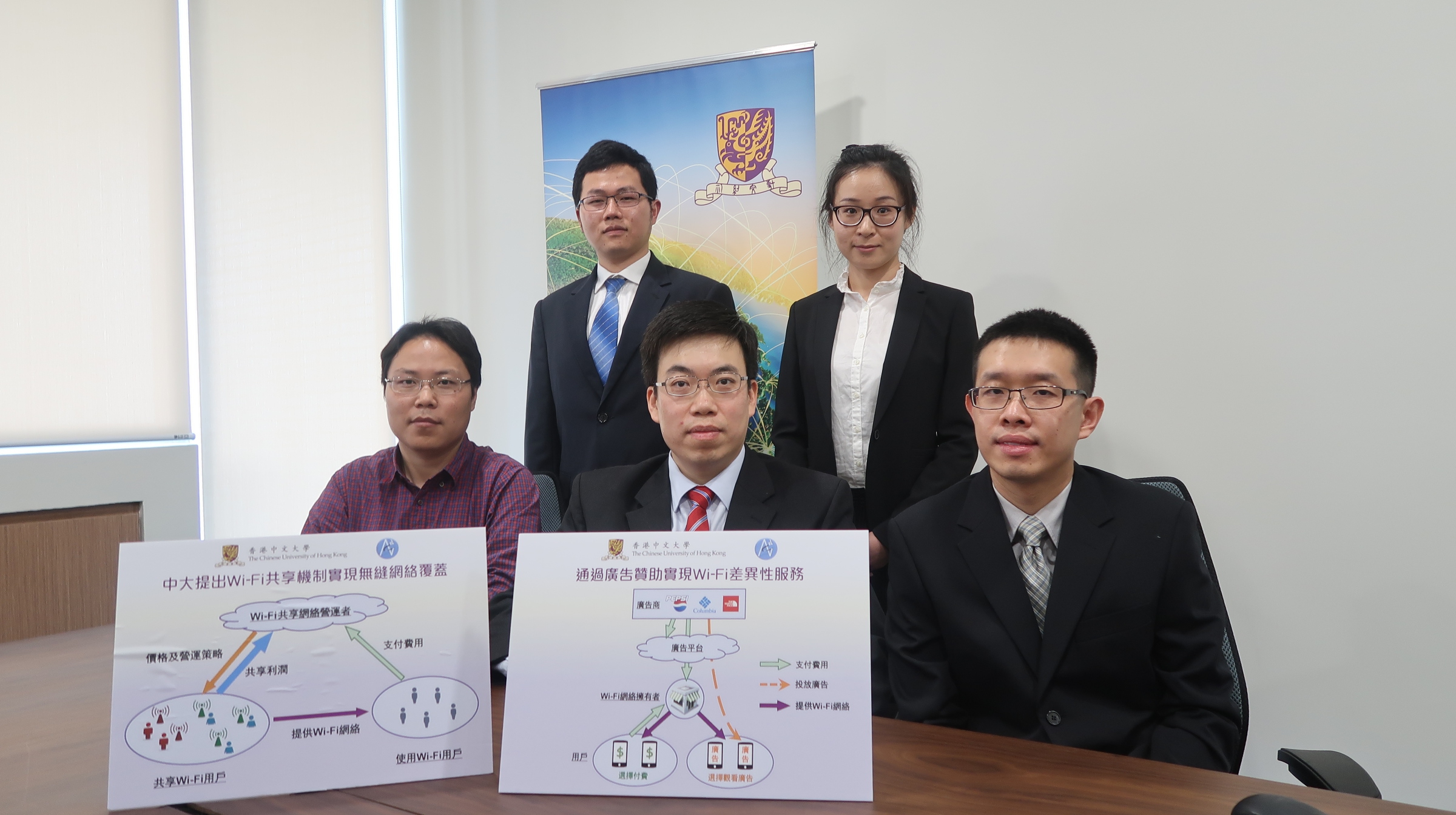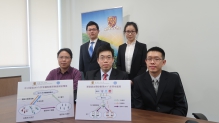CUHK
News Centre
CUHK Faculty of Engineering Proposes Innovative Business Models to Release Potential of Wi-Fi Networks
The Network Communications and Economics Lab (NCEL), led by Prof. Jianwei Huang from the Department of Information Engineering, The Chinese University of Hong Kong (CUHK), has recently proposed two innovative business models to explore the economic benefits of a Wi-Fi sharing community. These models not only benefit consumers but also create new business opportunities for network operators, leading to a situation of mutual advantage.
Achieve seamless network coverage by shared Wi-Fi hotspots
With the proliferation of smartphones and tablets, there is unprecedented growth in demand for bandwidth-hungry applications such as video calls, video streaming, and sharing of large files. A stable and high quality Wi-Fi broadband network is key to the support of all these operations. According to a forecast by the Cisco Visual Networking Index (VNI), by 2019, Wi-Fi networks will carry 54% of the traffic coming from smartphones while the traffic coming from tablets will reach 70%. Compared to traditional 3G and 4G cellular networks, Wi-Fi network equipment is low-cost, easy to install and manage, and can offer high transmission rates. Therefore, it is vital in supporting applications that involve large amounts of data transmission. However, a single Wi-Fi hotspot can only cover up to a hundred square meters, indoors. In order to create a seamless urban Wi-Fi network coverage, large numbers of hotspots must be installed, requiring an enormous amount of capital investment. This has become a bottleneck in the development of Wi-Fi networks.
A crowd-sourced, shared Wi-Fi community network is the perfect solution to this problem. According to current user habits, when at home the user is often unable to fully utilise his/her personal network access bandwidth. However, when on the street, it is difficult to find high-quality Wi-Fi hotspots, thus affecting the user’s Internet experience. The research team of Prof. Jianwei Huang suggests attracting individual users to share their Wi-Fi hotspots with each other through proper incentive mechanisms. In this way, tens of thousands of privately owned hotspots will form a large-scale Wi-Fi network that transcends national borders, while requiring little additional investments from a business operator. The idle network resources will be fully utilised, creating new economic value and maximising the potential of the network infrastructure.
Differential Wi-Fi pricings with advertising sponsorship
Apart from the crowd-sourced Wi-Fi community network, Professor Huang has also proposed a Wi-Fi advertising model, which benefits Wi-Fi operators, advertisers, and consumers. Today’s consumers have an increasing expectation of free Wi-Fi services, which makes it difficult for the operators to directly charge consumers for the Wi-Fi usages to cover the operators’ network investments and operational costs. This has heavily impeded the development of public Wi-Fi networks.
Professor Huang said, ‘The advertising sponsored Wi-Fi access is born out of this situation, and it allows people free Wi-Fi access for a certain duration in exchange for watching advertisements. Several Wi-Fi advertising platforms have been set up to enable collaboration between the operators and advertisers. The most well-known examples are Boingo and SOCIFI. With the Wi-Fi advertising business model, the advertisers can efficiently reach the targeted consumer groups based on information collected by the Wi-Fi networks, such as consumer locations and mobility patterns. Moreover, the operators can obtain extra revenue through selling the advertisement spaces to the advertisers. This encourages the operators to set up more Wi-Fi hotspots, which improves the overall Wi-Fi coverage and benefits the whole city.’
Based on the idea of Wi-Fi advertising, different venues can choose different approaches to monetise their Wi-Fi networks. For example, shopping malls that sell many different products and enjoy a high visitor frequency could directly charge people based on their Wi-Fi usage. However, the more specialised venues (such as electronics stores) with a lower visitor visiting frequency could provide advertising-sponsored free Wi-Fi access. The venues receive the payments from the advertisers, the advertisers deliver targeted advertisements to the visitors, and the visitors enjoy the free Wi-Fi service.
In order to help the operators design the optimal Wi-Fi monetisation strategies, the CUHK team has conducted analysis based on Game Theory, and has computed the optimal pricing schemes for the operators through considering all relevant factors. Under the optimised pricing schemes, the operators can achieve the highest revenue by adjusting their prices according to the proportion of visitors who choose to pay and those opt for advertising sponsored access. The study of the Wi-Fi advertising model will help operators generate considerable revenue from their Wi-Fi networks, and thereby encourage them to widen their Wi-Fi coverage and benefit the public.
About the Network Communications and Economics Lab (NCEL)
CUHK’s Network Communications and Economics Lab (NCEL) was established by Prof. Jianwei Huang in 2007, and is a leading international research group focusing on interdisciplinary research in communications, networking, and economics. Prof. Jianwei Huang has co-authored six books and over 200 papers in top international journals and conferences, with a total of more than 7,200 citations. Five of his publications were named ‘Highly Cited Papers’ by Web of Science, which put them amongst the top 1% of most frequently cited papers published during the past 10 years. NCEL’s research results received eight Best Papers Awards in top international conferences and journals, including the 2011 IEEE Marconi Prize Paper Award in Wireless Communications. NCEL has established close collaboration with over 40 world-class academic research institutes and communications network operators. Members of the NCEL Wi-Fi research team (Dr. Qian MA, Dr. Haoran YU, Dr. Lin GAO, and Dr. Man Hon CHEUNG) have participated in NCEL’s joint projects with teams from the US, Canada, Hong Kong, and Mainland China.
In 2016, Thomson Reuters released its list of 3,083 Highly-Cited Researchers from around the world. Amongst them, 27 were from Hong Kong, with two from CUHK. Professor Huang is one of them in the area of Computer Science. In the same year, he was elected Fellow of the prestigious Institute of Electrical and Electronics Engineering (IEEE) at the age of 37, one of the youngest amongst the new fellows.



